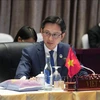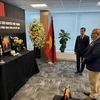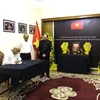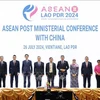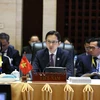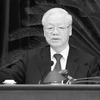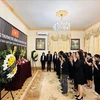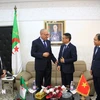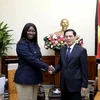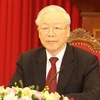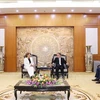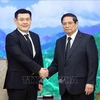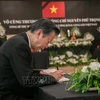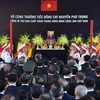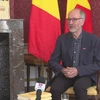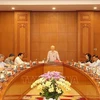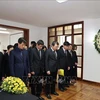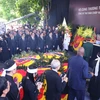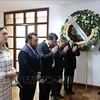Prime Minister Nguyen Tan Dung urged ASEAN to play an active role in the maintenance of peace, security and stability in the region, and requested all parties to respect and implement the Declaration on the Conduct of Parties in the East Sea (DOC) in full in his speech at the plenary session of the 25th ASEAN Summit in Myanmar’s capital Nay Pyi Taw on November 12.
The PM highlighted the importance of abiding by the DOC, especially Article 5, which stipulates parties must practice restraint and refrain from broadening or accelerating tensions and complicating the situation; must not use or threaten to use force; and must settle all disputes via peaceful means that respect international law, especially the 1982 United Nations Convention on the Law of the Sea (UNCLOS).
At the same time, ASEAN should work harder to implement previously made agreements, including the agreement between ASEAN and China that specifies measures and builds mechanism to ensure the full implementation of DOC. Furthermore, intensive negotiations on a Code of Conduct in the East Sea (COC) should be conducted, he said.
PM Nguyen Tan Dung noted that during the previous summit in May this year, ASEAN expressed its deep concern about the complicated developments that were escalating tensions in the East Sea and affecting peace, stability, maritime safety and freedom.
However, the East Sea issue remains complex, with large-scale reinforcements being built on reefs and islands, thus contradicting the DOC, he said.
Regarding regional and international matters, the PM said peace, cooperation and development continued to be major trends in East Asia.
However, the risk of instability and disputes in some regions continues to rise, coupled with non-traditional security challenges that affect peace, security, stability and development in the region, he warned.
Together with the international community, Vietnam strongly condemns terrorism in all its forms, he said.
Vietnam supports Resolution 2170 of the UN Security Council as well as all efforts of the international community against terrorism and extreme violence on the basis of respecting international law and the UN Charter, PM Nguyen Tan Dung stated.
With regard to the establishment of the ASEAN Economic Community and post-2015 orientations, he affirmed that Vietnam would cooperate with other ASEAN members to fulfil the roadmap towards the Community.
He also pointed to the need for ASEAN to step up its cooperation with partners on preventing and dealing with security challenges, especially non-traditional ones such as natural disasters, epidemics, climate change, water resource security, maritime security, terrorism and trans-national crimes, considering this a high priority for ASEAN as well as its partners.
Meanwhile, in his opening remarks, Myanmar President U Thein Sein reaffirmed that solidarity and a united stance were a prerequisite and foundation for the success of an ASEAN Community, contributing to a stronger position and voice in the region and the world.
Once the new ASEAN Community is set up, it will be necessary to continue to strengthen connectivity and links, building trust, and promoting central role of the ASEAN in the existing regional cooperation mechanism and shaping regional architecture, he said.
During the plenary session, ASEAN leaders discussed a wide range of issues, including ASEAN Economic Community progress, the post-2015 ASEAN community, ways to boost partnerships, as well as regional and international matters of common concern.
They agreed that over 80 percent of the establishment of the Community was finished.
Along with building regional architecture on the basis of the ASEAN code of conduct, it is a must to highlight the need to enhance the coordination efficiency of ASEAN institutions, they said.
The leaders also continued to voice their concern about the East Sea issue, while underscoring the significance of maintaining peace, stability, maritime and aviation security, safety and freedom in the sea.
They underscored the importance of abiding by international law and the 1982 UNCLOS, as well as the full implementation of the DOC, especially Article 5.
Concluding the session, the leaders passed the Nay Pyi Taw Statement on the ASEAN Community's post-2015 vision, a statement on strengthening the capacity of the ASEAN Secretariat and enhancing collaboration between ASEAN bodies, and an ASEAN Declaration on Climate Change.
They also announced the establishment of an ASEAN Institution for Green Economy to foster experience sharing and cooperation on climate change.
Established in 1967, ASEAN, or the Association of Southeast Asian Nations, comprises ten members, namely Brunei, Cambodia, Indonesia, Laos, Malaysia, Myanmar, the Philippines, Singapore, Thailand, and Vietnam.-VNA
The PM highlighted the importance of abiding by the DOC, especially Article 5, which stipulates parties must practice restraint and refrain from broadening or accelerating tensions and complicating the situation; must not use or threaten to use force; and must settle all disputes via peaceful means that respect international law, especially the 1982 United Nations Convention on the Law of the Sea (UNCLOS).
At the same time, ASEAN should work harder to implement previously made agreements, including the agreement between ASEAN and China that specifies measures and builds mechanism to ensure the full implementation of DOC. Furthermore, intensive negotiations on a Code of Conduct in the East Sea (COC) should be conducted, he said.
PM Nguyen Tan Dung noted that during the previous summit in May this year, ASEAN expressed its deep concern about the complicated developments that were escalating tensions in the East Sea and affecting peace, stability, maritime safety and freedom.
However, the East Sea issue remains complex, with large-scale reinforcements being built on reefs and islands, thus contradicting the DOC, he said.
Regarding regional and international matters, the PM said peace, cooperation and development continued to be major trends in East Asia.
However, the risk of instability and disputes in some regions continues to rise, coupled with non-traditional security challenges that affect peace, security, stability and development in the region, he warned.
Together with the international community, Vietnam strongly condemns terrorism in all its forms, he said.
Vietnam supports Resolution 2170 of the UN Security Council as well as all efforts of the international community against terrorism and extreme violence on the basis of respecting international law and the UN Charter, PM Nguyen Tan Dung stated.
With regard to the establishment of the ASEAN Economic Community and post-2015 orientations, he affirmed that Vietnam would cooperate with other ASEAN members to fulfil the roadmap towards the Community.
He also pointed to the need for ASEAN to step up its cooperation with partners on preventing and dealing with security challenges, especially non-traditional ones such as natural disasters, epidemics, climate change, water resource security, maritime security, terrorism and trans-national crimes, considering this a high priority for ASEAN as well as its partners.
Meanwhile, in his opening remarks, Myanmar President U Thein Sein reaffirmed that solidarity and a united stance were a prerequisite and foundation for the success of an ASEAN Community, contributing to a stronger position and voice in the region and the world.
Once the new ASEAN Community is set up, it will be necessary to continue to strengthen connectivity and links, building trust, and promoting central role of the ASEAN in the existing regional cooperation mechanism and shaping regional architecture, he said.
During the plenary session, ASEAN leaders discussed a wide range of issues, including ASEAN Economic Community progress, the post-2015 ASEAN community, ways to boost partnerships, as well as regional and international matters of common concern.
They agreed that over 80 percent of the establishment of the Community was finished.
Along with building regional architecture on the basis of the ASEAN code of conduct, it is a must to highlight the need to enhance the coordination efficiency of ASEAN institutions, they said.
The leaders also continued to voice their concern about the East Sea issue, while underscoring the significance of maintaining peace, stability, maritime and aviation security, safety and freedom in the sea.
They underscored the importance of abiding by international law and the 1982 UNCLOS, as well as the full implementation of the DOC, especially Article 5.
Concluding the session, the leaders passed the Nay Pyi Taw Statement on the ASEAN Community's post-2015 vision, a statement on strengthening the capacity of the ASEAN Secretariat and enhancing collaboration between ASEAN bodies, and an ASEAN Declaration on Climate Change.
They also announced the establishment of an ASEAN Institution for Green Economy to foster experience sharing and cooperation on climate change.
Established in 1967, ASEAN, or the Association of Southeast Asian Nations, comprises ten members, namely Brunei, Cambodia, Indonesia, Laos, Malaysia, Myanmar, the Philippines, Singapore, Thailand, and Vietnam.-VNA
